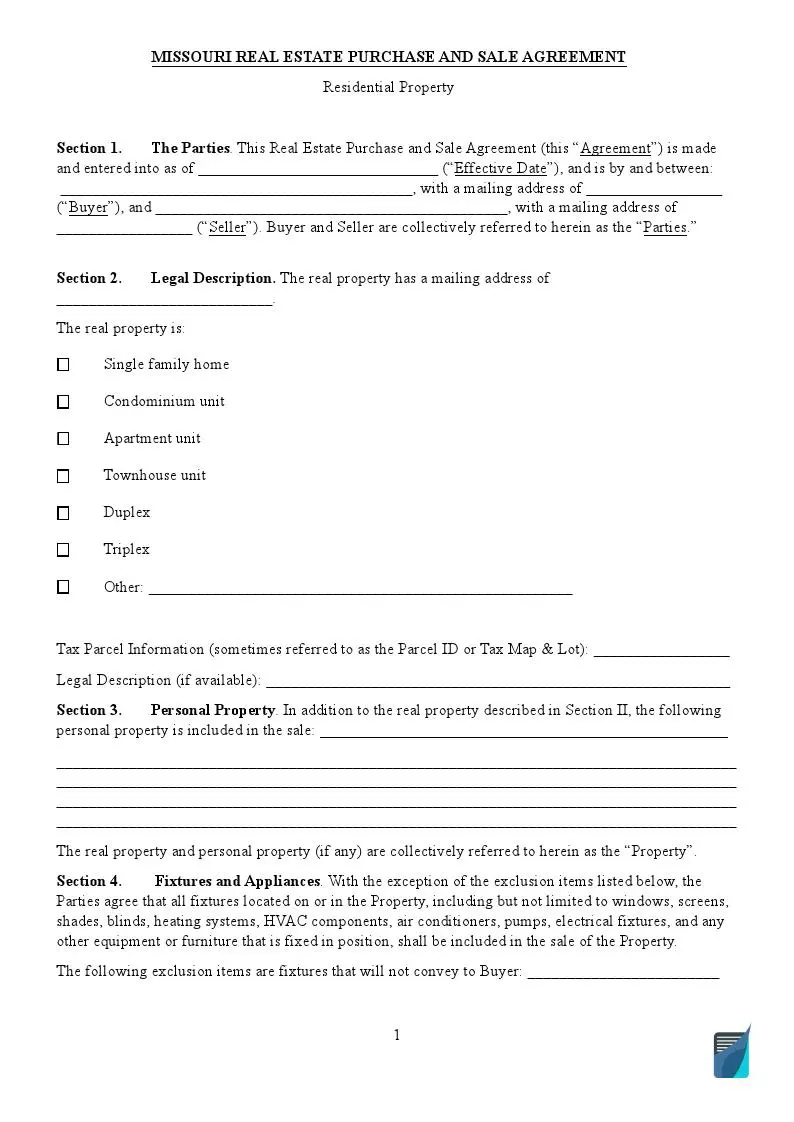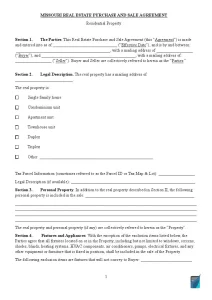Missouri Real Estate Purchase Contract
Buying a house or another real estate unit is always very exciting, like a new chapter in life. The Missouri real estate purchase agreement is used to document the relationship between the seller and the real estate buyer. This document constitutes a purchase and sale agreement between two parties. Usually, the buyer draws up the offer and passes it on to the seller. If the parties reach an understanding, they sign a real estate purchase agreement, which contains all their transaction details.
This article will tell you about several types of real estate sales contract and pay special attention to disclosures on the seller’s part. A house sale and purchase transaction always carry a certain amount of risk, and such disclosures allow the buyer to be more aware of it.

Build Your Document
Answer a few simple questions to make your document in minutes
Save and Print
Save progress and finish on any device, download and print anytime
Sign and Use
Your valid, lawyer-approved document is ready
Missouri Residential Purchase and Sale Agreement
This type of fillable purchase and sale agreement concerns residential property that the seller transfers to the buyer in return for a specified amount outlined in the contract.
For the contract to be recognized as valid, it must contain certain parts:
- Transaction parties’ full names and addresses
- Property’s legal description with full address
- Inclusions and exclusions so that the buyer knows what they pay for and what they will find in the house, such as furniture, electrical appliances, and so on
- The purchase price with details of the financial transaction
- Closing date
- Methods of financing
- Policy regarding title and survey
- Terms of inspection (the time given for it and the elimination of defects found during the inspection)
- Disclosure statements (we will go into more details on this point below)
- Attachments
- Signatures and dates
It is important to note that the contract is only valid when signed by both parties. Both the seller and the buyer thus confirm their intention.
The state of Missouri is included in the list of states practicing “buyer beware” or, in other words, “caveat emptor.” That is, the seller is not obliged to provide data on the house’s physical condition, and it is the buyer’s task to find out about any defects independently. But there are several exceptions to this rule and situations in which the seller is required to report and disclose additional information about the home. Please read our paragraph on disclosures, in which we will tell you everything in detail.
Missouri Commercial Purchase and Sale Agreement
The only difference between this agreement and the previous one is that this one concerns commercial real estate, not residential real estate. Otherwise, everything is the same. The parties describe the following in the contract:
- Parties’ full names and details
- Full description of the commercial property
- Financial details of the transaction—amount, payment schedule, financing methods, and more
- Date of completion of the transaction and transfer of ownership
- And the rest of the details that we indicated above
The agreement also requires signing. Both parties affix the date of signing the document, their name, and their signature. After that, the contract comes into force.
Required Seller Disclosures in Missouri
As we noted above, Missouri is a state with a “buyer beware” policy, whereby the seller is not mandated to disclose the physical condition and defects of the property. However, the law requires the seller to provide certain details. Let’s consider these circumstances.
Methamphetamine Production
According to §442.606 of Missouri Rev. Stat., the seller must notify the prospective buyer that the home was previously used for methamphetamine production, even if the current owner was not involved in such production. The production of this drug produces toxic substances that can harm residents. If the property owners are aware of such a situation, they must notify the buyers in writing.
Lead-Based Paint Disclosure
This disclosure is also designed to keep buyers from buying a toxic home or warn about this. This disclosure is mandatory for homes built before 1978, a period when a special paint with toxicity was used. By 42 U.S. Code §4852d, the seller must notify the buyer if the house was built before the specified period.
Seller’s Disclosure Statement for Residential Property
This is optional in Missouri. But sellers often try to provide this information to attract potential buyers. This form provides detailed information about all parts and systems of the house, its defects, and breakdowns.
Separately, it is worth mentioning §260.213 of the Missouri Revised Statutes. It states that the seller must also report if a permitted or unpermitted solid waste disposal site or demolition landfill is located on the property.
There is also little disagreement over Missouri’s laws. Although the seller is not required to complete the Seller’s Disclosure Statement, according to Missouri Rev. Stat § 407.020, it is forbidden to conceal material defects or mislead in the sale of real estate. Therefore, if the seller is aware of any significant defects or, even more so, toxic substances in the territory, it is worth informing potential buyers about this to avoid litigation.
However, sellers are not required to report cases of crime, murder (or suicide) committed on the property. Also, there is no strict need to inform the buyer if the house’s former residents have/had certain diseases (for instance, AIDS / HIV). Such regulations are reflected in the Missouri Revised Statutes §442.600.
Real Estate Agents Disclosure
If you decide to use the services of real estate agents, you should know that according to Missouri Revised Statutes §339.730.1, they are obliged to communicate all information known to them to the prospective buyer. For example, if you say that sometimes the roof leaks in the house, they are obliged to report it.
However, this law also stipulates that the agent is not required to carry out an independent inspection to find out all defects in the house and is not required to verify your words.
While many sellers are afraid to make disclosures, it is still worth doing. First, it will be more honest, and it may even save you from trials—even if you win, you will spend much time. Secondly, it will help you achieve a more open relationship and, paradoxically, speed up the transaction process due to both parties’ honest approach.
